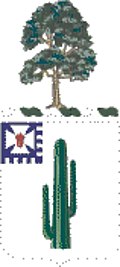35th Infantry Regiment (United States)
| 35th Infantry Regiment | |
|---|---|

Coat of arms
|
|
| Active | 1916 |
| Country |
|
| Branch |
|
| Type | Light infantry |
| Garrison/HQ | 2d Battalion, Schofield Bks, Hawaii |
| Nickname(s) | "Cacti" (special designation) |
| Motto(s) | Take Arms! |
| Engagements |
World War I World War II Korean War Vietnam War Afghanistan Campaign Iraq Campaign |
| Decorations | Presidential Unit Citation (2) Valorous Unit Award Meritorious Unit Commendation (2) Philippine Presidential Unit Citation Republic of Korea Presidential Unit Citation (3) |
| Insignia | |
| Distinctive unit insignia | |
| U.S. Infantry Regiments | |
|---|---|
| Previous | Next |
| 34th Infantry Regiment | 36th Infantry Regiment |
The 35th Infantry Regiment ("Cacti") was created on 1 July 1916 at Douglas, Arizona from elements of the 11th, 18th and 22nd Infantry Regiments. The 35th served on the Mexico–US border during the First World War and was stationed at Nogales, Arizona in 1918. It fought a border skirmish on 27 August 1918 during the Battle of Ambos Nogales.
In World War II, Korea, and Vietnam it served as part of the 25th Infantry (Tropic Lighting) Division.
As of 2012, the only active element of the regiment is the 2nd Battalion, which is assigned to the 3rd Brigade Combat Team (Infantry), 25th Infantry Division.
The regiment's coat of arms and its distinctive unit insignia reflect its history. The regiment was originally formed in Arizona from elements of the 11th, 18th, and 22nd Infantry Regiments. These organizations are represented on the canton of the crest, in the upper left-hand corner. The white Maltese cross represents the 11th Regiment, the red acorn represents the 18th Regiment, and the embattled partition line of the canton represents the 22nd Regiment. The cactus represents the original service along the Mexico–US border against the bandits of Pancho Villa.
The following is a direct quote from the US Army The Institute of Heraldry regarding the 35th Regiment.
Description/blazon
A gold color metal and enamel device 1 1/16 inches (2.70 cm) in height overall consisting of a shield blazoned: Argent, a giant cactus Vert. On a canton embattled (for the 22d Infantry) Azure, a cross patée of the field (for the 11th Infantry) charged with an acorn Gules (for the 18th Infantry).
Symbolism
This regiment was originally organized in Arizona with personnel from the 11th, 18th and 22d Infantry. These organizations are shown on the canton. During the Civil War the predecessor of the 11th Infantry was in the 2d Division, V Corps, the badge of which was a white Maltese cross; the 18th Infantry was in the 1st Division, XIV Corps, with a red acorn as the badge. The 22d Infantry is represented by the embattled partition line of the canton. The cactus represents the original service of the 35th Infantry on the Mexico–US border.
Background
The distinctive unit insignia was originally approved on 28 Jun 1923. It was amended to change the method of wear on 30 Apr 1926.
...
Wikipedia

